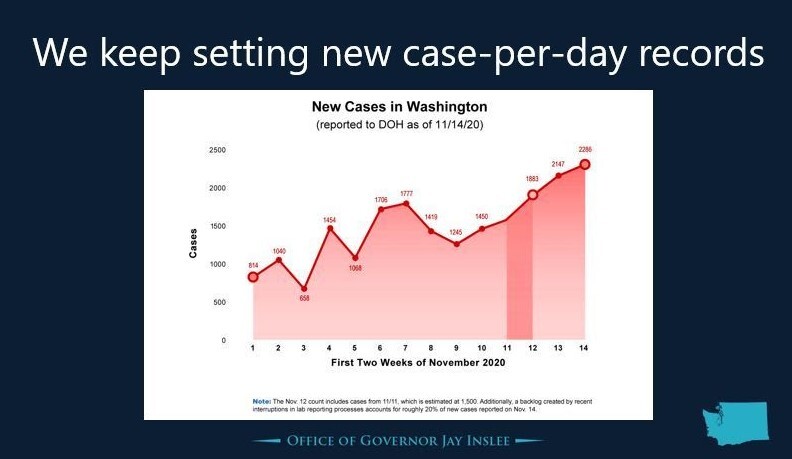New statewide restrictions implemented in response to COVID-19 surge
November 15, 2020
In response to a lasting spike in COVID-19 cases the Washington State Department of Health (DOH) called “extremely alarming,” Gov. Jay Inslee has implemented new statewide restrictions on travel, gatherings and business.
“This spike puts us in a more dangerous a position as we were in March,” Inslee said during a press conference Sunday. “And it means, unfortunately, the time has come to reinstate restrictions on activities statewide to preserve the public’s well-being, and to save lives.”
The restrictions affect the whole of Washington, and go into effect Monday, Nov. 16 at 11:59 p.m. New restrictions of restaurants will not go into place until Wednesday, Nov. 18 at 12:01 a.m. The restrictions are planned to last four weeks, ending on Dec. 14.
Activities not specified in the restrictions should follow current health and safety guidelines. Education, both K – 12 and higher education, is exempt from the new restrictions. Also exempt are child care, courts and court-related proceedings, according to the Governor’s website.
Additionally, the state will commit $50 million in aid to help mitigate the financial impacts of new restrictions on businesses and employees. Businesses can apply for forgivable loans from the Small Business Administration (SBA), or from their local bank. If employees are retained, the loans aren’t required to be paid back, according to the SBA website.
“We understand that this is both an economic and a public health crisis,” Inslee said. “We do not take lightly the impact these restrictions will have on local businesses, many of which have already had a very difficult year. You are not alone, and we will continue to provide supports.”
Gatherings
While addressing the state, Inslee encouraged Washington residents to avoid gatherings with anyone outside their immediate household, including for the upcoming Thanksgiving holiday.
Indoor social gatherings with people outside your immediate household, such as visiting friends or family, are now prohibited unless all parties self-quarantine for 14 days prior to gathering, or self-quarantine for seven days prior and test negative for COVID-19 no more than 48 hours before gathering.
“The collective choices each of us are making every day have an enormous impact on the spread of COVID-19. We all must re-evaluate our plans for the upcoming holidays and everyday life. As community rates go up, the risk posed by social gatherings increases as well,” said Deputy Secretary of Health for COVID-19 Response Lacy Fehrenbach. “The only way to slow the spread is for us all to recommit to the actions we know work. We have flattened our curve twice before, and it’s time to do it again.”
Religious services are now limited to 25% indoor occupancy or 200 people, whichever is fewer. Choirs, bands, ensembles and congregational singing are prohibited, but soloists are allowed. Face coverings are required at all times.
Weddings and funerals may continue with limited attendance, but cannot take place indoors at any size.
Visits to long-term care facilities may only take place outdoors, with exceptions in place for essential support workers or end-of-life care.
Business
Starting Wednesday, restaurants and bars may no longer provide indoor service. To-go service and limited outdoor seating is still allowed, provided it follows current health and safety guidelines. Outdoor seating table sizes are limited to five people.
In-store retail, grocery stores and personal services may now only operate at 25% occupancy. Any areas where people can congregate must be closed.
Fitness centers and gyms must close indoor services. Bowling alleys, museums, zoos, aquariums and movie theaters must close as well.
Outdoor fitness activities are limited to five people with mandatory face coverings. Youth and adult amateur sporting activities are also now limited to outdoors only, with mandatory face coverings.
Travel
All travelers in Washington, whether they are traveling to Washington from other states or countries, are advised to self-quarantine for 14 days once they’ve reached their destination, Inslee’s travel advisory reads. Travelers should also limit their interactions to their immediate households.
Additionally, the advisory encourages residents of Washington who are planning to travel to remain at home.
“Avoiding travel can reduce the risk of virus transmission and bringing the virus back to Washington,” the advisory reads.
Inslee issued this travel advisory, applicable to all non-essential travel, on Nov. 13. The advisory defines essential travel as traveling for “work and study, critical infrastructure support, economic services and supply chains, health, immediate medical care and safety and security.”
More information on what travel purposes are considered essential or non-essential can be found at the U.S. Embassy’s website here.
The DOH recommends individuals continue to practice health and safety measures that have been in place since the beginning of the pandemic, including limiting gatherings, wearing a cloth face covering, staying home when sick and washing hands often. Additionally, they recommend planning with friends and family on ways to celebrate holidays remotely this year.
“There is light at the end of this tunnel,” Inslee said. “We will continue to fight, adapt and persevere. It may be months before we’re totally out of the clear, but medical advances are putting us closer to the goal of restoring all activities eventually. For now, we have to keep everyone’s interests in mind and take steps that protect all Washingtonians.”
Anyone who has symptoms of or has been exposed to COVID-19 needs to get tested, the DOH said in a Nov. 13 update. The DOH has created a list of testing locations across Washington on their website to help those who may not know where they can get tested.



Connie Tomlinson • Nov 15, 2020 at 4:41 pm
Thank you for writing this timely and informative article.